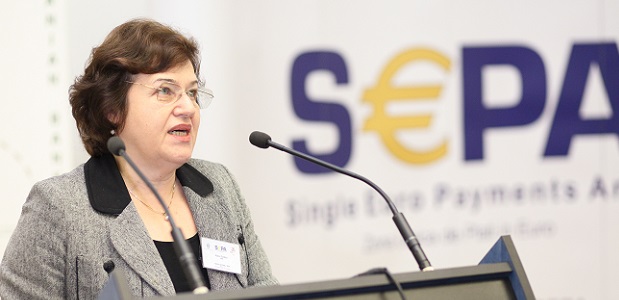
Transfond developed a local currency Instant Payments (IP) system based on the SEPA Instant Credit Transfer Scheme (SCT Inst) in Romania. The system was launched on 22 of April with two payment service providers (PSPs) already on board and is intended to be accessible to all customers in Romania by 2020. The European Payments Council (EPC) interviewed Rodica Tuchila, the Executive Director of the Romanian Association of Banks, to shed some light on this new IP service and its future.
Through the IP service, the banks can deliver 24/7/365 payment services to their customers – both consumers or companies – up to a maximum of 49,999 RON in less than ten seconds, all in a secure environment. The service is based on the SCT Inst scheme developed by the EPC.
„We consider the Instant Payments (IP) system was a necessary development for a performing payment system aligned with the European payment systems, bringing a number of benefits to the participants and their customers, such as increasing the service availability and performance level, increasing the speed of settlement and money circulation, attracting volumes from cash and cheque payments, and improving customer loyalty by launching a highly attractive banking product.”, Tuchila said.
„The benefits of the IP service to consumers are generated by the opportunity to instantly buy goods and services online or to send money instantly to relatives, suppliers or other recipients. Companies of any size can initiate urgent payments within the above-mentioned ceiling, ensuring the continuity of operations, if, for example, commercial partners deliver their services or products only after the payment has been confirmed or even after the collection of funds, or if any other emergency requires one or more urgent payments.”
How will the IP service be implemented – progressively or as a ‘big bang’? Which channels and use cases will be targeted? The IP service will be progressively implemented. The service was launched on 22 April, when two banks began offering the service to their customers on the Romanian market.
A number of banks are in their final stages of preparation to connect to the IP infrastructure. They will enrol according to their own strategies for the products and services they offer customers and depending on the concrete status of the internal systems and procedures preparation.
In addition to the IP service, Transfond is developing a service called AliasPay, which will allow the initiation of payments through a mobile device using only the payee’s mobile phone number instead of their IBAN code. This will support the Romanian banking community in developing and delivering innovative and competitive payment services.
Could you share the major challenges for Romanian willing to implement the system?
As the IP service requires the constant availability of payment systems to enable payments initiation and processing outside regular business hours, one of the major challenges for the
willing to implement the system is to adapt their core banking systems and communication infrastructures to support the 24/7/365 availability. Payments applications should also be adapted or changed to allow the execution of real-time payments.
Liquidity management and anti-money-laundering analysis are also important challenges for IP service providers.
Finally, how do you see the IP system evolving in the future? Do you think its participants will also join the SCT Inst scheme for euro transactions and, if so, when? All banks are expected to join the IP service, making it accessible to all customers in Romania. The IP system may be the basic infrastructure for future developments and the provision of innovative payment products based on internet banking, mobile banking or other forms of payment initiation, diversifying the banks’ services portfolio and increasing customer loyalty. Indeed, there is potential for the participants to also join the SCT Inst Scheme for euro real-time transactions, depending on customers’ increasing requirements for innovation and speed, and I think this could possibly happen by 2020.
Banking 4.0 – „how was the experience for you”
„To be honest I think that Sinaia, your conference, is much better then Davos.”
Many more interesting quotes in the video below: